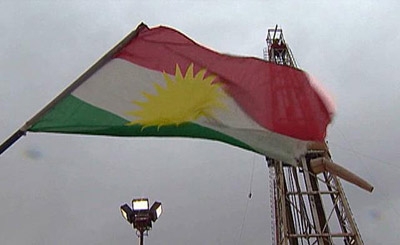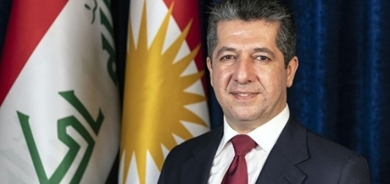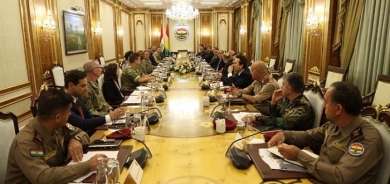Kurds struggle for energy autonomy
July 31, 2014
From Media

A tanker carrying $100m of crude, anchored 60 miles off the coast of Texas, is at the centre of the latest war of words between Iraq’s central government and the Kurdistan Regional Government over the latter’s right to produce and market its natural resources.
Although the Kurdish region does not have giant oil fields like those in Southern Iraq, it has a vast undeveloped resource base that if tapped into could make it a new and significant player in the energy market.
The Iraqi government filed a complaint to a Texas court this week claiming the 1m barrels on the United Kalavrvta had been smuggled out of the semi-autonomous Kurdish region without permission.
After initially issuing an order to seize the oil, the judge then said the US lacked jurisdiction to do so given the ship’s distance from the shore.
The KRG maintains its oil was legally produced, shipped and exported.
While the court continues to deliberate, the recent to and fro that is playing out on the international stage is the latest bid by the KRG for political and economic autonomy, and has again raised questions over whether it can convince the world of its legitimacy as an energy power.
“The sale of this oil is the endgame,” says Shwan Zulal, a Kurdish and Iraqi oil industry analyst.
“This dispute goes back many years. It started with exploration in 2006, moved into discoveries and then pipelines were built, which was the ultimate challenge to Baghdad’s authority. Selling the oil is what they have been waiting for.”
The KRG has been known for its better security situation and investment environment than other parts of Iraq and has attracted many oil exploration and production companies to the region.
Its position was strengthened amid the sectarian violence of the past couple of months, when peshmerga forces proved to be stronger than Iraqi soldiers against Islamist militias. Much to the chagrin of the central government, the KRG used this opportunity to expand into new territory, move ahead with oil exports and push for a greater share of Iraq’s oil revenues.
But the KRG faces a number of barriers to developing its oil sector.
“The KRG has got ahead of itself over the past month in trying to establish an independent presence,” says Richard Mallinson at London-based consultancy Energy Aspects.
“The KRG has little to show for the recent oil export attempts beyond yet more damage to relations with Baghdad. The region is still on a path to ever greater autonomy and probably eventual independence but those ambitions are suffering a setback,” he adds.
While the KRG’s oil industry is booming, analysts say supply is still at a very nascent stage. The region currently produces just over 200,000 barrels a day. The KRG had been looking to increase exports to 400,000 b/d by the end of the year, but any significant increases require an expansion in pipeline capacity and involve surmounting current marketing constraints.
A major hindrance to this is the worsening relationship between the central government and the KRG.
Disputes over contracts and payments have led to stoppages of pipeline exports since 2011. The region’s budget was cut by Baghdad at the start of this year as Erbil made tracks to sell oil directly to international markets through a newly made pipeline that leads to Ceyhan, a port belonging to its main business partner, Turkey.
The KRG says that Baghdad – which claims sole authority over Iraq’s natural resources – has withheld $7bn since January, emboldening its attempts for independence and providing further impetus for the region to generate its own revenues.
Although the Kurds have a high export target to compensate for their lost budget, analysts say they are unlikely to rise to above the sub-50,000 b/d mark that is sent by truck as negotiations between Erbil and Baghdad on revenue sharing agreements remain slow and difficult.
“The KRG is facing a financial problem now,” says Luay Al Khatteeb, visiting fellow, Brookings Doha Centre, and adviser to the Federal Parliament of Iraq.
“They are really desperate for oil export revenues to repay the deficit. If they don’t find reliable buyers and generate sustainable supplies for the international market they are going to run into difficulties.”
Regarding the United Kalavrvta, he says “as long as Kurdistan is part of Fed sovereign state of Iraq, Kurds will continue to bump into these commercial and legal challenges, specifically on the oil front”.
The cargo is just one of four 1m-barrel shipments that the KRG has loaded from Turkey, before which, most exports went through a pipeline controlled by the federal government, with Baghdad collecting the revenues for distribution.
Analysts say Baghdad has threatened oil traders and put diplomatic pressure on governments not to buy the Kurdish crude, hence only one of these cargos has been sold.
Unable to deliver its crude, storage tanks for Kurdish crude at Ceyhan have backed up and are now at capacity, Reuters reports, forcing the KRG to shut off its pipeline.
The ambivalence of the international community towards Kurdish oil is a major drawback.
“It would not surprise me if the vessel is ultimately forced to go elsewhere as potential buyers steer clear of this highly charged issue,” says Jason Bordoff, director of the Columbia University Center on Global Energy Policy and former Obama administration official.
The US has long maintained that oil exported from Iraq should be done under Baghdad’s auspices, fearful of advocating for a scenario that may generate greater instability in the region.
Whether Turkey and Iran can be made comfortable with the idea of Kurdish independence with all that might mean for the Kurdish diaspora across their regions is another story and any real opposition may also constrain the flow of oil to the market.
Although the US State Department says its policy position remains the same, there are hints that their approach may have softened of late.
Even so, the prospect of the cargo on board the United Kalavrvta being sold to buyers in the US is looking increasingly unlikely, which could hamstring the KRG’s bid to be recognised as an autonomous state internationally.
“Until the KRG solves the export problem, it will not unlock the foreign revenues it needs to achieve more financial independence and invest in growing future production,” says Mr Mallinson.
Financial Times











